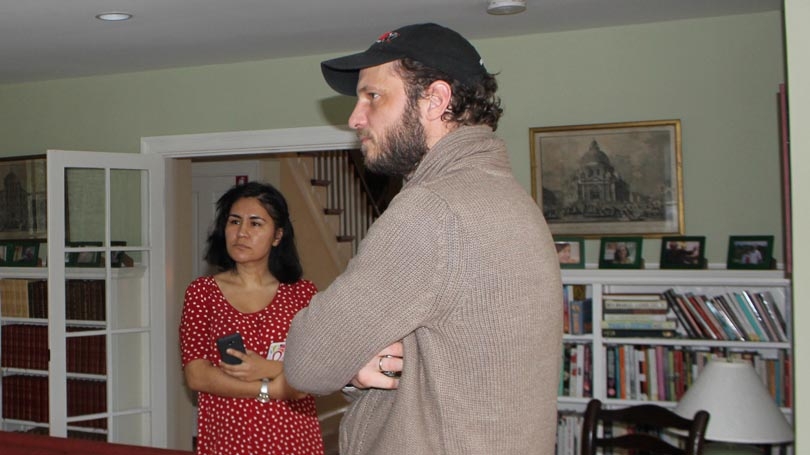
Montgomery Fellow, artist Eric van Hove, discusses his art with graduate students (Photo by Preetha Sebastian, MALS '17)
Surrounded by the fireplace warmth and enthusiasm from those in attendance, van Hove began his discussion inspired by the questions: What is the difference between art/aesthetics and mass produced items we use everyday? How can I create something that is both beautiful and useful to people?
Growing up in Cameroon, Africa in a family of architects and a cultural environment that celebrated Maghreb (North and Northwest Africa) craftsmanship, van Hove developed an interest in context and conceptualism.
"During the first 15-20 years of my art career, I was mostly working on ephemeral works, thinking and getting to know the canvas, the world, semiotics; I was not so much involved in the art market." A Belgian passport, he says, allowed him to travel and learn different perspectives from local peoples, cultures, economic and political issues, and art traditions.
Van Hove moved to Marrakech, Morocco in 2011 upon earning an MA and PhD from Tokyo Gakugei University in 2005 and 2008, respectively. He reflected that Moroccan society relies on traditional crafts and comprises 30% of the workforce today, and in many ways craft has a more active role in society. "The skills and materials craftsmen use have a resume of history in Africa. Craft is a dictionary, a collective history, a manifest in making," van Hove responded to the question of craft's importance in Morocco.
"Craft is a flexible medium, but it becomes less flexible when [craftsmen] compete with mass produced items. Craftsmen can produce something unique, enjoy the work, and be paid well for it, especially in local tourism."
The 21st century is a time of mass produced items, however with advancement in technology and international commerce, van Hove believes we have come away from having the same mass produced item as the rest of society. We have instead grown a preference for personalization in these items. In van Hove's view, flexible specialization is appropriate in this modern age.
Take his praised work, V12 Laraki for instance. Abdeslam Laraki, owner of Laraki Automobiles, a Moroccan sports car company, designed and built a car using local materials, only the Mercedes-Benz V12 engine which was imported from Germany was not local. Van Hove questioned, "How about we take apart that engine and see if we can craft and build it 100% in Morocco?"
With the cooperation and skills of over forty Moroccan craftsmen, van Hove crafted the beautiful and ornately complex replica of the S-600 Mercedes-Benz V12 engine over a 9-month period in 2012. The detailed engine is built from over 50 locally sourced materials, which include silver, cotton, yellow copper, walnut wood, and cedar wood. When presented to the public in Marrakech, the reactions van Hove received were, in his words, insane and positive. "Many people came and jumped to see the engine like it was theirs. Some put their kids on it, kissing it!"
The Moroccans' positive reception gave van Hove and his team faith that they could accomplish something with their skills and furthered their desires to create aesthetic and useful items. Van Hove said of the success of V12 Laraki, "Africans have inherited modernity but they also want to embrace it, using craft and local materials to create functional products." This, he says, allows Moroccans to feel pride in their skills and their country. V12 Laraki is one manifestation of this and an attestation to Moroccan craft's relevance to Moroccan society.
During his incumbency here at Dartmouth, van Hove is collaborating with a task force of students from the Studio Art Department and the Thayer School of Engineering to conceptualize, design, and build a motorbike. Tuck School of Business and the Dartmouth Entrepreneurial Network are also in collaboration with the project, helping to bring in consumer perspectives, market predictions, and to campaign crowd funds. He and his team will use the 3-D printer at Thayer and build the motorbike at Hopkins Center Wood Workshop.
This project builds on his first prototype of a fully-functioning moped he designed and built from a Chinese model in Morocco. The moped was crafted using local materials with the exception of an imported battery and engine. "A moped is a symbol of high socioeconomic status in Africa," he says. He hopes that he and his team can build a motorbike that African artisans can reproduce using local materials, sell to middle class locals, and help stimulate the market and economy.
Van Hove and his team's prototype is scheduled to be finished by the end of the winter term and will be presented in his art show in Belgium on April 15. With continued collaboration with Dartmouth students and ten of the Moroccan craftsmen who helped build V12 Laraki, van Hove hopes to start production of one hundred motorbikes using the completed prototype this summer.
Klaus Milich directs the Montgomery Fellows Program at Dartmouth. The program brings eminent professionals and scholars, from academic and non-academic fields around the world, to reside at the college for a given time. More information about the program, current fellow Eric van Hove, and past fellows can be found at http://montgomery.dartmouth.edu.